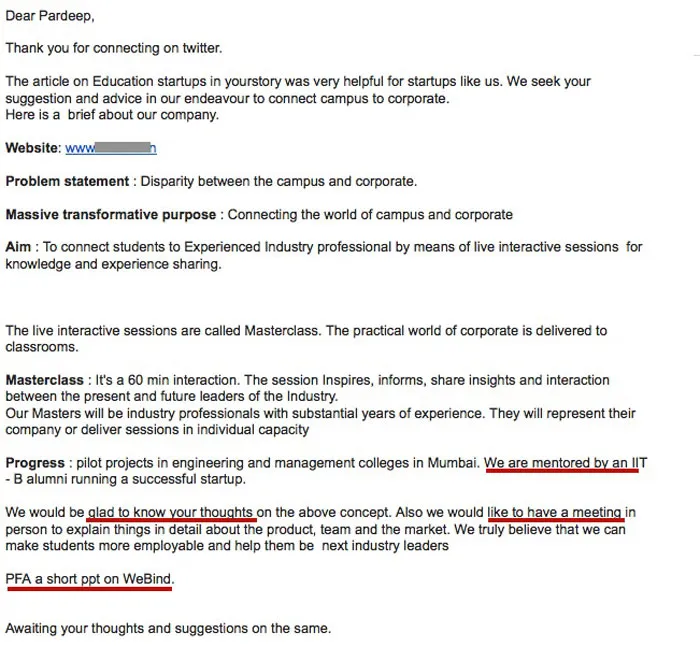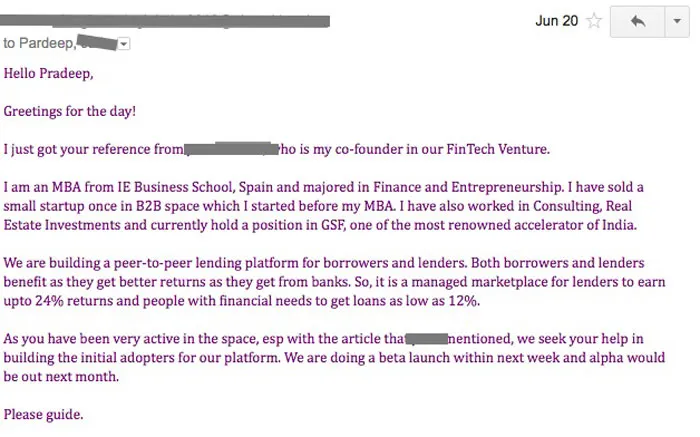5 ridiculous ways of asking feedback over email and how to correct them
We should learn from one another’s experiences because life is too short to try everything yourself. I always seek out experts when I need any feedback on my idea or product. In this regard, I have some tips to share with you, so that you get the best advice without mucking up the opportunity.

Image credit "ShutterStock"
Occasionally, I receive emails from people who want to start a venture or have already launched a product. I reply to all emails, but sometimes I have to dig deep to understand what they are looking for, and how I can help them. In quite a few cases, there is a lack of clarity in the questions, and therefore in the expectations from me as feedback. What makes it more difficult is that I have only a limited amount time to spend on each email.
I know most people love to help the startup community. But they may not be getting the right feedback if they are committing some of the mistakes listed below.
- Too much introduction
There is no need to tell a story about yourself unless it's absolutely necessary. If your question is about validation of a product, then there is no need to explain how and why you started your venture. Only if your question is regarding failure or success in the past, then it would make more sense to involve the reader in your story.
#Tip: A one line introduction is sufficient to introduce yourself.
#Example – I am an ex-founder of two startups and I am now building a fin-tech startup.
- Lengthy and unorganized email
Believe me; no one has the time to read lengthy emails to find the real context hidden within a pile of the text. Be brief; it will help your mentor in helping you.
Look at this confusing email:

I mean no offense to the writer of the email; I am just using it as an example. He did not introduce himself before talking about his venture. In this case, I would have been more interested in knowing about him and understanding what he expects from me - rather than getting a picture his venture in detail. He could have simply shared his website link or blog instead of this bulky email.
He mentioned about his mentor who ran a startup and was an IIT-B alumnus, but he did not mention what he expected from me. Mentioning another mentor's name is good only when pitching to a VC for funding!
Besides, he has attached a PPT that I would have had to go through. That’s asking for too much time, of anybody.
- You don’t know what to ask
If you write “would be glad to know your thoughts on the above concept” - I will make an assumption that you are unclear about your thoughts. You don’t know what to ask me. You are asking an open question and I cannot help you here.
All I will respond with is: “You have got a good idea, execute it with excellence”.
#Tip: Don’t present yourself to be a clueless person. Ask precise and relevant questions.
#Example: A good e-mail, in terms of length and depth.

- Asking too many questions is asking no questions at all.
Occasionally, I receive emails which bombard me with questions. I lose context while replying to so many questions in a single email. Of course, the quality of my feedback also gets diluted.
On the other hand, some people talk about the problem they are solving and their struggles in the startup world, but they don’t ask any questions. I wonder what they expect of me. I simply appreciate the startup idea and close the email thread.
#Tip: Ask only one question; but be concise and precise.
#Example: Short and Concise Email

- Asking for a meeting in the first email
Why will someone agree to a meeting with you? Are you paying him or her consulting fees? Or is the meeting for his or her benefit?
If you are asking for advice from anyone, then you have to respect their time. You can take the benefit of free advice only over an email. You should only invite someone over for coffee once you have established a healthy relationship.
#Tip: Build a relationship over email before asking for the phone number or a meeting.
#Example: Is there a compelling reason for a meeting?

No Introduction. No business detail. No meeting context.
Should I be out all the day, meeting people, just because they have checked my profile online and might need some assistance in a business context? ☺
I love to meet people; in fact, I try to find at least two interesting people every week to exchange my thoughts with. I even meet new people; not related to my domain or the world of startups. It helps me see the world from their point of view.
Can you present yourself interestingly enough so that people might want to meet you?
Bonus Tip: Follow up
You may have asked some good questions but your mentor may be taking some time to get back with the answers. It’s your responsibility to follow up after few days. Many a time mentors may get busy and lose track of their emails. Send a follow-up email, asking them politely if they had any time to work on the questions you sent.







